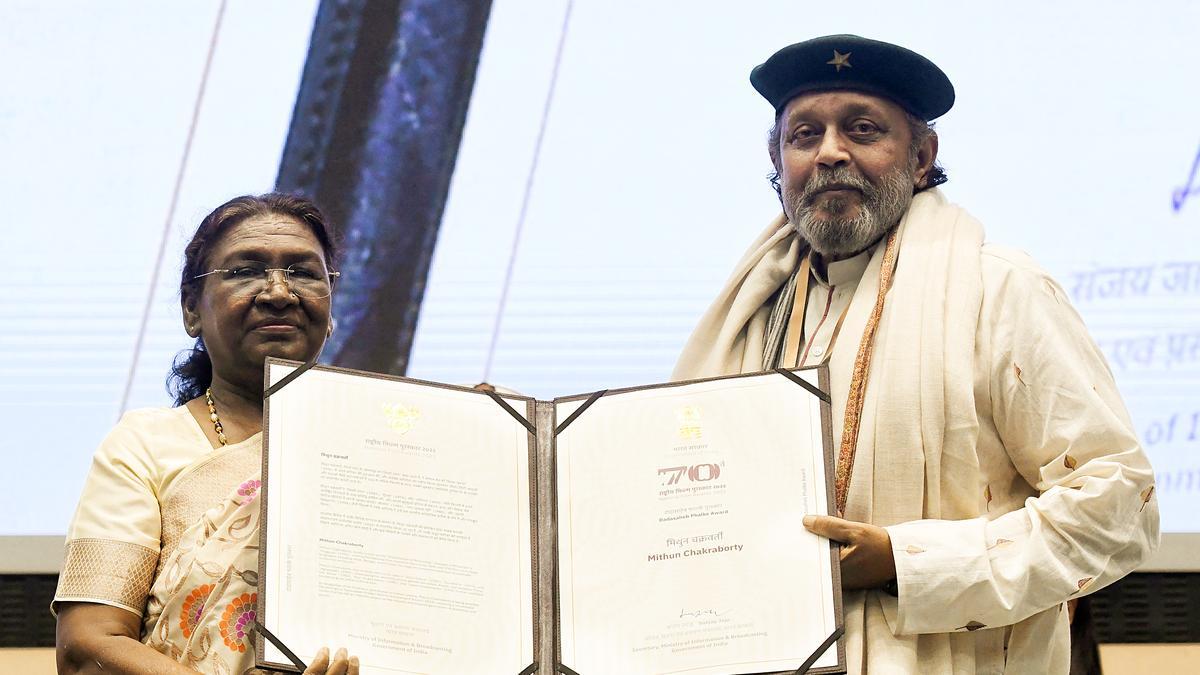
In a dazzling ceremony held at Vigyan Bhawan in New Delhi on Tuesday, October 8, veteran actor and politician Mithun Chakraborty was bestowed with the prestigious Dadasaheb Phalke Award at the 70th National Film Awards. This event marked yet another milestone in Mithun’s illustrious career, as he joined the ranks of Indian cinema’s most celebrated personalities. The Dadasaheb Phalke Award is the highest honor in Indian cinema, recognizing lifetime contributions to the film industry, and was presented to Mithun by President Droupadi Murmu.
The occasion was a glittering affair attended by dignitaries, fellow artists, and luminaries from the film fraternity. As Mithun took to the stage to accept the accolade, the auditorium erupted into a standing ovation, underlining the deep respect and admiration he commands within the industry. During his acceptance speech, Mithun took the audience on a poignant journey through his career, sharing insightful and sometimes humorous anecdotes from his decades in film.
“Standing here today reminds me of when I first received a National Award. I was overwhelmed by the adulation and it distracted me from my work,” Mithun reminisced, addressing the audience with heartfelt sincerity. The actor recounted a particular incident related to his debut film ‘Mrigayaa’, which won him critical acclaim as well as the National Film Award for Best Actor. Mithun humorously recalled a producer’s cheeky remark about his attire—or lack thereof—in the film. “He said he could only imagine what I’d look like with clothes on,” Mithun quipped, evoking laughter from the crowd.
The actor’s speech was not only a walk down memory lane but also a reflection on the challenges he faced. Despite the acclaim that came with his debut, such success also brought its own set of challenges. Mithun shared a sobering story about realizing the pitfalls of newfound fame. “After my first National Award, I thought I had become Al Pacino. But reality hit hard when a producer showed me the door. That day, I realized the importance of humility,” he said, illustrating the lesson that grounded his later successes.
Mithun also touched upon the prejudice he encountered in Bollywood due to his skin color, a topic he addressed with candor.
. “I was often told that dark-skinned actors wouldn’t last in Bollywood. I even asked God to change my color,” he admitted. However, instead of succumbing to these adversities, Mithun honed his craft, particularly his dancing skills, to carve out a unique identity for himself. “I focused on becoming so extraordinary in my performances that people wouldn’t notice my skin color. That’s when I became the ‘sexy, dusky Bengali babu,'” he declared, earning applause from an adoring audience, including Union Minister for Information and Broadcasting Ashwini Vaishnaw.
Reflecting on his hard-earned success, Mithun shared, “I’ve never been handed anything on a platter. Everything I achieved was the result of hard work. There were times when I questioned God about my struggles, but this award brings a sense of closure and peace.” He left a powerful message for upcoming actors, urging them to dream big and persevere. “Never stop dreaming. If I can make it, so can you. Let your dreams work even when you are asleep,” Mithun concluded, his words resonating deeply with both artists and fans alike.
Fondly referred to as ‘Mithun Da’, the actor made his first film appearance in 1976 with ‘Mrigayaa’, where his portrayal of a Santhal rebel wowed audiences and critics alike. This role was the beginning of a career that saw him win three National Film Awards, with subsequent wins for ‘Tahader Katha’ (1992) and ‘Swami Vivekananda’ (1998). Beyond his acting prowess, Mithun has significantly impacted the music world, delivering iconic dance numbers such as ‘I Am a Disco Dancer’, ‘Jimmy Jimmy’, and ‘Super Dancer’, which continue to be celebrated across generations. More recently, he appeared in Vivek Agnihotri’s ‘The Kashmir Files’, further cementing his status as a versatile actor.
Mithun Chakraborty’s journey from a newcomer facing industry bias to a celebrated icon serves as an inspiring narrative of resilience and talent, a testament to his indomitable spirit and exceptional contribution to Indian cinema.












